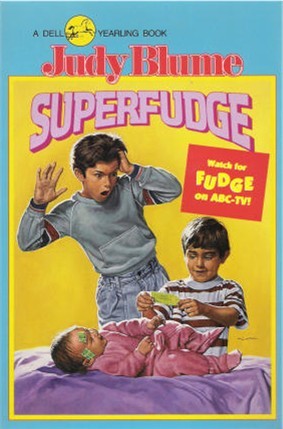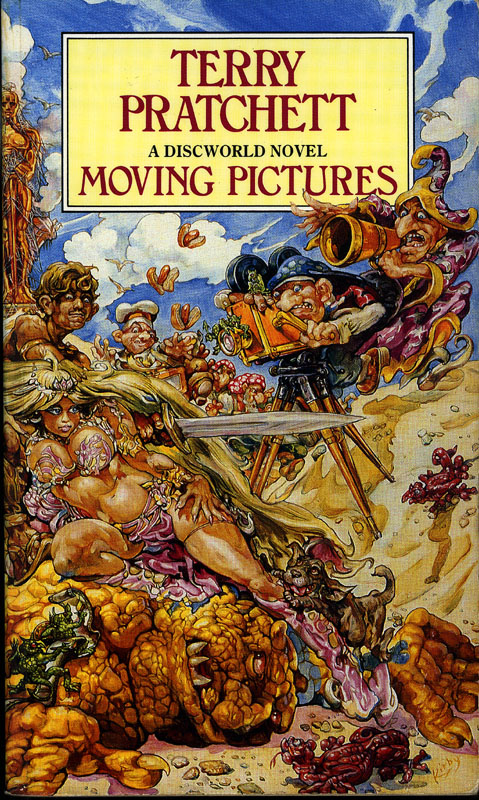If you visit Waterstone’s regularly, or even if you’ve just
poked your head around the door of one of their shops recently, you may be
aware of their campaign ‘The Book That Made Me’. It’s simple enough. Members of
the public, Waterstone’s employees and even a few celebrities contribute a few
paragraphs, or even just a couple of sentences, about the book that has most
influenced their lives. As the website puts it:
“Books are powerful
things. They can introduce us to new ideas. Give us the courage to do what we
couldn't do before.
Even transform our
lives completely.”
I’ve seen a few friends contribute, and I’ve been thinking
about it myself over the last few days – the only problem being that I can’t
narrow it down to just one! So I’ve cheated, and chosen three.
Book the First: SuperFudge, by Judy Blume
Peter Hatcher's little
brother is four. And he's as monstrous as ever! When Fudge discovers that his
new baby sister can't play with him, he tries to sell her. When that doesn't
work, he tries giving her away. And on his first day at school he kicks his
teacher and calls her Rat face. Can his big brother help him out again?
It’s a simple enough story. Fudge (real name Farley Drexel,
which he hates for perhaps obvious reasons), is a classic mischievous kid, and
when he inevitably acts up, hilarity ensues. And that’s why I loved it, because
it was truly hilarious. It was one of my dad’s favourite books to read to me,
and we’d both be cracking up by the time lights out came along.
Of course, I’ve read lots of hilarious books over the years,
but while SuperFudge wasn’t the first
funny book I’d read (or had read to me, as the case might be), and it may not
have been the first book I read, it is certainly the first book I remember reading, and the first book
that I remember truly loving, along with the other books in the series. Reading
is an enormous part of my life. I read dozens of books a year, I studied
English Literature to post-grad level, and I’m attempting to pursue a career in
anything at least vaguely connected to books (although not doing terribly
well!). I give SuperFudge, and Judy
Blume, an awful lot of credit for fostering the love of books in me.
Book the Second: Moving Pictures, by Terry Pratchett
'Holy Wood is a
different sort of place. People act differently here. Everywhere else the most
important things are gods or money or cattle. Here, the most important thing is
to be important.' Alchemists have always thought that they can change reality,
shape it to their own purpose. Imagine then the damage that could be wrought on
the Discworld if they get their hands on the ultimate alchemy: the invention of
motion pictures, the greatest making of illusions. It may be a triumph of
universe-shaking proportions. It's either that or they're about to unlock the
dark secret of the Holy Wood hills - by mistake...
I probably read this when I was too young by half. Not only
did most of the jokes probably go over my head – it’s a fantasy comedy about
the arrival of cinema to a quasi-medieval world, and I still haven’t seen half
the films referenced – but I distinctly recall my mother being unimpressed that
my father had let me read a book with such bad language in (Pratchett not being
above a good swear word, although nothing too foul; on the other hand, I was
about nine when I read it). That’s not what makes it special though. What makes
it special is that it is, as far as I can recall, the first fantasy novel I’d
ever read.
The reason for that, probably, is the cover more than the
writing.
You have to admit, it’s striking, and not just for the
improbably physique of the leading lady (Josh Kirby never particularly bothered
getting his cover art accurate, per se; he was far more interested in creating
cool art, and while his successor, Paul Kidby, is a ‘better’ artist in the
sense that his art actually resembles the characters on the page, he’s often
nowhere near as interesting). It was striking enough to make me want to read
it, despite not understanding the book at anything other than surface level – which
isn’t terribly complex, it being the story of magical monsters invading the
Disc before being stopped – and I credit Moving
Pictures with being the first proper fantasy book I read. The rest, as they
say, is history; fantasy is without doubt my favourite genre, whether we’re
talking literature, television, film or videogame. Probably ninety percent of
the things I read or watch today can likely be traced back to me reading this
book all those years ago. So you can blame Pratchett.
Book the Third: Harry Potter, by J.K. Rowling
I’m not bothering with a summary for this! And I’m cheating
a little, and taking the whole series rather than any one single entry within
it.
This one’s simple. Sort of. In the aftermath of Half-Blood Prince, a friend introduced
me to fanfiction, which I read quite a lot of over the next couple of years. A
lot of it was pretty bad, and it was during my first year at university that I
first thought “I can do better than this.” So I started writing, and…well,
looking back I probably didn’t do much better than those stories I’d scoffed
at, but the seed was planted. Six or seven years later, and I love writing. It’s
really my one ambition in life, although I’m not terribly good at actually
getting beyond the planning stage. It will happen though; I have so many
stories I want to tell one day.
And there we go. The book that made me love reading. The
book that made me love fantasy. And the book(s) that made me love writing.


